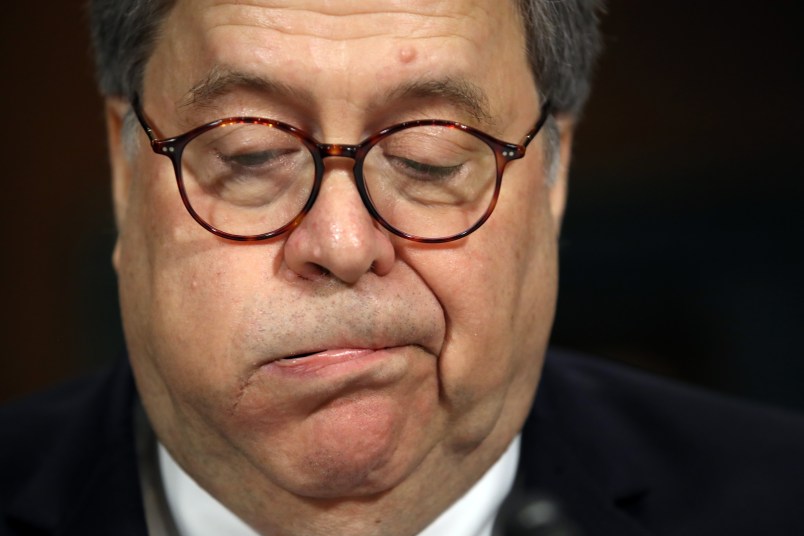Special counsel Robert Mueller’s investigation may be over, but the fourteen separate investigations that he spun off to U.S Attorney’s Offices around the country now have a new caretaker: Attorney General Bill Barr.
Given Barr’s demonstrated willingness to protect the Trump White House from investigations the President finds “unfair,” the attorney general is facing questions and calls for recusal — amid demands for his resignation — from these related probes.
Former federal prosecutors told TPM that it’s unclear how much influence Barr will be able to exert over sprawling investigations that are already in progress. It’s true that U.S. attorneys are directly beholden to Barr and the President in a way that Mueller was not, and lack institutional safeguards that keep special counsels independent. But Barr can’t simply flip a switch and instantaneously shut off an ongoing investigation.
“This is a many-headed beast, and I don’t know that you can cut everything off,” Brooklyn Law School professor and former federal prosecutor Miriam Baer told TPM.
Still, Democrats are expressing concerns about Barr’s independence.
During a Wednesday Senate Judiciary Committee hearing, Sen. Richard Blumenthal (D-CT) asked Barr whether he had discussed any of the spun-off Mueller probes with White House personnel, including Trump. The attorney general left the issue open.
“I just don’t recall offering any substantive information about a case,” Barr said, saying that it was possible that one of the investigations came up in conversation during his now 10-week tenure.
Blumenthal then asked Barr if he would recuse from overseeing the probes, as his predecessor Jeff Sessions did with the Mueller probe itself.
“No,” Barr replied.
A core difference between the spinoff cases and the original Mueller probe is that the special counsel operated under regulations written to mandate his independence.
“The gestalt is different,” Bruce Green, a professor at Fordham University School of Law and a former prosecutor on the Iran-Contra team, told TPM.
“With Mueller, the idea that, ultimately, the report is going to go to Congress and be made public is part of what preserves the independence of the special counsel,” Green said, contrasting it with a U.S. attorney’s office where, even if prosecutors decide to indict, “there’s a limit to what becomes public, depending on whether a case is dismissed or not.”
Mueller also operated under a regulation dictating that he had to document each time he wanted to take an investigative action, but could not.
Baer pointed out that certain cases or investigative steps require further “consultation” or, in some cases, permission from Main Justice in Washington. Subpoenaing a journalist or getting a wiretap, for example, requires contact with DOJ headquarters.
“There are centralizing policies,” she said, adding that “ordinary course” investigations proceed without Main Justice consultation.
Green said that high-level DOJ officials historically involved themselves in cases that “have been viewed as stuff where you want to have uniform national policy, and not different approaches from the U.S. attorney’s offices.”
The nature of all fourteen ongoing Mueller-originated probes remains unknown.
One is thought to be a probe into the Trump inaugural committee, led by prosecutors at the Southern District of New York. That office is traditionally seen as one of the most independent U.S. attorneys offices in the country.
Baer, a former Manhattan federal prosecutor, said “there has been this sense that the Southern District runs its own ship.”
Other Mueller-adjacent probes have been completed or are under indictment. Michael Cohen is headed to prison this month after pleading guilty in Manhattan federal court, while former lobbyist Gregory Craig was indicted last month in D.C. over alleged misrepresentations surrounding his work with Paul Manafort’s Ukrainian clients.
Some of those appear to have continued uninterrupted under Barr’s tenure though, as Green pointed out, the U.S. attorneys are often a black box.
“I don’t think Barr is gonna start micromanaging investigations that are in the D.C. U.S. Attorney’s Office or the Southern District of New York,” he said. “With more than 90 federal districts, historically there would be no way that a centralized DOJ can oversee everything that’s being done.”
“You can do it in a finite number of cases, corruption cases or cases involving federal officials,” he added.






